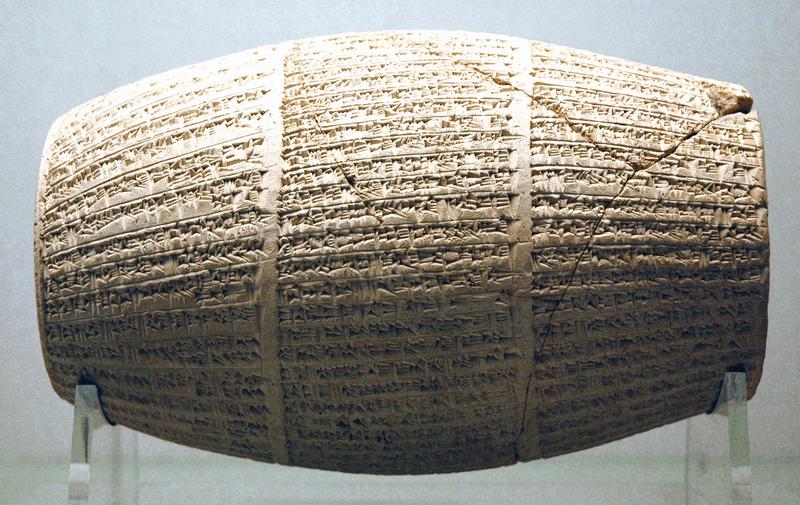Daniel 5:1-31
2 Peter 2:1-22
Psalm 119:113-128
Proverbs 28:19-20

Daniel 5:7 – Until 1854, historians denied the reign of Belshazzar.
All other known historical records once disagreed. Ancient historians like Herodotus, Megasthenes, Berossus, and Alexander Polyhistor, not to mention a vast number of cuneiform documents, were united in claiming that the last king of the Neo-Babylonian empire was Nabonidus.5 Belshazzar was not even mentioned anywhere except in the book of Daniel and literature derived from it.
So why did Belteshazzar offer only the third ruler in the Kingdom? Because his dad, King Nabonidus was still alive!

“As for me, Nabonidus, king of Babylon, save me from sinning against your great godhead and grant me as a present a life long of days, and as for Belshazzar, the eldest son -my offspring- instill reverence for your great godhead in his heart and may he not commit any cultic mistake, may he be sated with a life of plenitude.”[3]

The Nabonidus Chronicle reveals that “The king spent ten years in Arabia and left Babylonia administered by his son, Bel-shar-usur (Belshazzar of the Book of Daniel in the Old Testament). ” (Wikipedia)
Daniel 5:21 – Yesterday we looked at the evidence for the seemingly incredible account of Nebuchadnezzar’s madness. Today we see Daniel is doubling down on his story.
Daniel 5:30 – A very abrupt transition between Daniel 5:29 and Daniel 5:31. Who is Darius the Mede and why doesn’t history record him? From DefendingInerrancy
Some modern scholars claim that the author of Daniel mistakenly thought that the Medes conquered Babylon instead of the Persians. They claim that this author then confused Darius I, king of Persia (521–486 b.c.) with the conqueror of Babylon and identified this figure as Darius the Mede. However, there is no reason to assume that the Book of Daniel is in error. Darius the Mede is a different person from Darius I of Persia. Darius the Mede was a subordinate to Cyrus the Great. Cuneiform texts refer to Darius the Mede as Gubaru who was appointed by Cyrus to be governor over all of Babylonia. The tendency to deny the historical accuracy of Daniel simply because there is currently no corroborating historical information stems from the antisupernatural bias of modern scholarship. Daniel’s historical record has proven to be a reliable source of information.
http://defendinginerrancy.com/bible-solutions/Daniel_5.31.php
2 Peter 2:1 – Peter is warning about false prophets in the church! There are 8 warnings about false prophets in the gospels and epistles. Notice that we’re not even done with the first century and Peter is warning about people “even denying the Lord that bought them.” Sadly as we look thru church history we see many false doctrines spread. From Randy Alcorn’s EPM:
“More theological battles have been lost to enemies inside the church than to those outside. The evil one has targeted us for deception. Nothing less than the welfare of God’s people is at stake.”
https://www.epm.org/blog/2017/May/29/church-history-false-teachers
2 Peter 2:7 – Peter just solved a mystery – “just Lot,” “righteous man” (2 Peter 2:8), “the godly” (2 Peter 2:9). Up until now we weren’t quite sure if Lot was a follower of God. Living in Sodom, committing incest with his daughters (Genesis 19:33-36), we weren’t quite sure what his spiritual condition was.
2 Peter 2:10 – After warning about the “lust of uncleanness,” we see this warning about “despis[ing] government.” Why the concern about maintaining authority? Rebels “are not afraid to speak evil of dignities?” Go back a few verses to 2 Peter 2:4 – angels in heaven had rebelled against Him and they were cast into chains of darkness in hell. God takes rebellion as seriously as witchcraft (1 Samuel 15:23).
2 Peter 2:22 – This is a vivid and viscerally repulsive portrayal of the danger of false teachers. How can we avoid false teachers? By seeking sound doctrine!
Psalm 119:120 – Do you have a healthy respect for God?
Psalm 119:126 – Reminds me of Psalm 127:1
Proverbs 28:19-20 – Notice the tension here – work is good, work will bring riches, but seeking riches is not good. May we seek to be faithful and not “haste to be rich.” Speaking of get-rich-quick schemes, 95% of people in multi-level-marketing (MLM) drop out within ten years, and 99.71% of participants lose money. Or that the average American spends $223.04 per year on the lottery.
The average Massachusetts resident spends $767 per year on the lottery trying to get rich quick. But if he invested the same $767 every year at 8% interest, by the time he retired, he would have $1,846,607.48! You can be rich slowly.
Share how reading thru the Bible has been a blessing to you! E-mail us at 2018bible@vcyamerica.org or call and leave a message at 414-885-5370.



